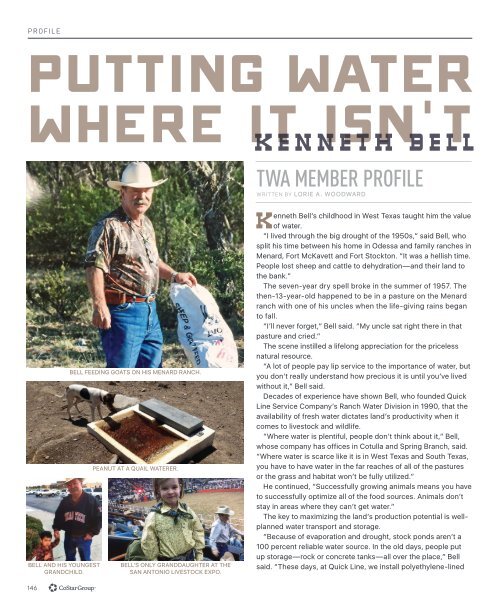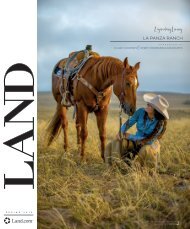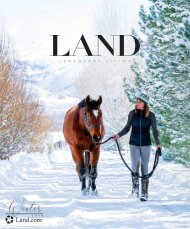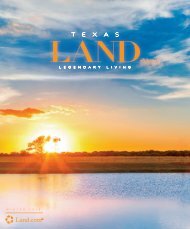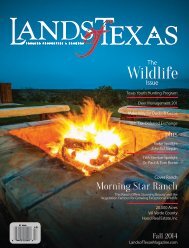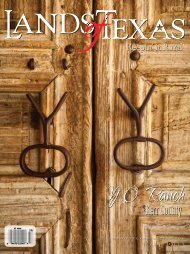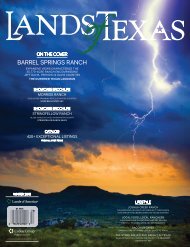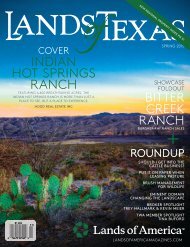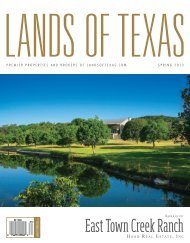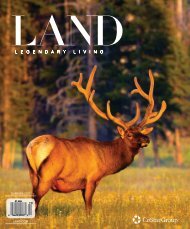Create successful ePaper yourself
Turn your PDF publications into a flip-book with our unique Google optimized e-Paper software.
PUTTING WATER<br />
WHERE IT ISN'T<br />
KENNETH BELL<br />
PROFILE<br />
TWA MEMBER PROFILE<br />
WRITTEN BY LORIE A. WOODWARD<br />
BELL AND HIS YOUNGEST<br />
GRANDCHILD.<br />
BELL FEEDING GOATS ON HIS MENARD RANCH.<br />
PEANUT AT A QUAIL WATERER.<br />
BELL’S ONLY GRANDDAUGHTER AT THE<br />
SAN ANTONIO LIVESTOCK EXPO.<br />
Kenneth Bell’s childhood in West <strong>Texas</strong> taught him the value<br />
of water.<br />
“I lived through the big drought of the 1950s,” said Bell, who<br />
split his time between his home in Odessa and family ranches in<br />
Menard, Fort McKavett and Fort Stockton. “It was a hellish time.<br />
People lost sheep and cattle to dehydration—and their land to<br />
the bank.”<br />
The seven-year dry spell broke in the summer of 1957. The<br />
then-13-year-old happened to be in a pasture on the Menard<br />
ranch with one of his uncles when the life-giving rains began<br />
to fall.<br />
“I’ll never forget,” Bell said. “My uncle sat right there in that<br />
pasture and cried.”<br />
The scene instilled a lifelong appreciation for the priceless<br />
natural resource.<br />
“A lot of people pay lip service to the importance of water, but<br />
you don’t really understand how precious it is until you’ve lived<br />
without it,” Bell said.<br />
Decades of experience have shown Bell, who founded Quick<br />
Line Service Company’s Ranch Water Division in 1990, that the<br />
availability of fresh water dictates land’s productivity when it<br />
comes to livestock and wildlife.<br />
“Where water is plentiful, people don’t think about it,” Bell,<br />
whose company has offices in Cotulla and Spring Branch, said.<br />
“Where water is scarce like it is in West <strong>Texas</strong> and South <strong>Texas</strong>,<br />
you have to have water in the far reaches of all of the pastures<br />
or the grass and habitat won’t be fully utilized.”<br />
He continued, “Successfully growing animals means you have<br />
to successfully optimize all of the food sources. Animals don’t<br />
stay in areas where they can’t get water.”<br />
The key to maximizing the land’s production potential is wellplanned<br />
water transport and storage.<br />
“Because of evaporation and drought, stock ponds aren’t a<br />
100 percent reliable water source. In the old days, people put<br />
up storage—rock or concrete tanks—all over the place,” Bell<br />
said. “These days, at Quick Line, we install polyethylene-lined<br />
146


